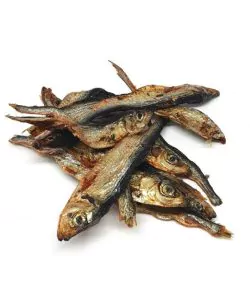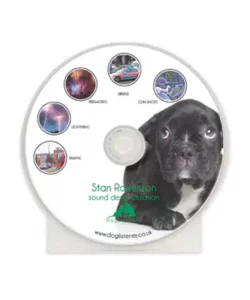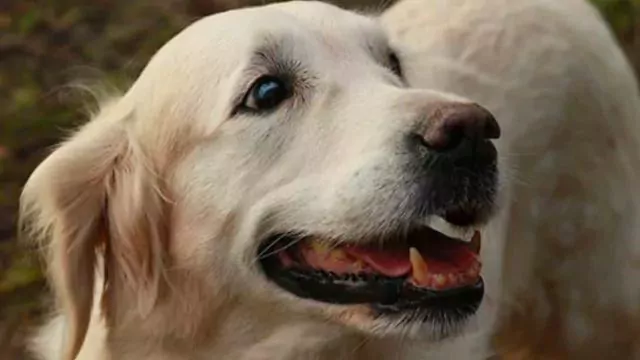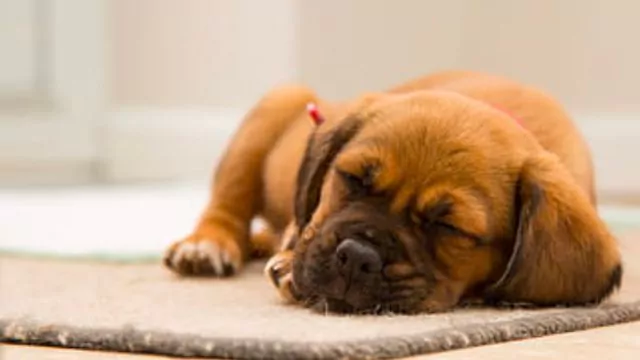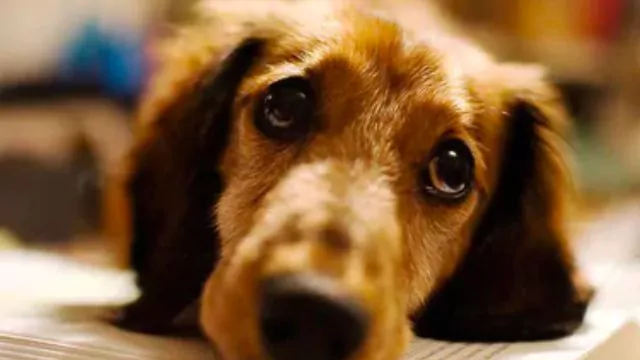Sound Aversion and Puppy Desensitisation
Fireworks and Noise Aversion Treatment
Adult Dogs and Puppy Desensitisation
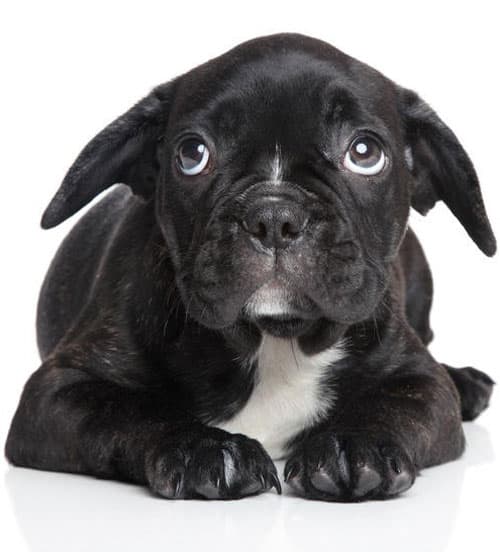
This can cause some dogs to become extremely anxious and terrified and can lead to other aversion type behaviours.
Common reactions include hiding, shaking, panting, vomiting, defecation, urination, panic and occasionally destructive behaviours such as chewing through doors and walls to escape to a safe territory.
Hard as it may seem, you must not comfort your frightened dog, it will only encourage and reinforce their fears.
Sympathy and comfort to a dog are almost the opposite of how a human perceives it, Dogs see it as reinforcement rather than reassurance.
Therefore you reinforce the anxiety and make the dog or puppy more concerned about the fear they are feeling.
Be blasé, try and distract by playing a favourite game so he learns to cope on his own.
If you give him too much fuss he’ll think this means that there really is something to be scared about!
Of course, once he has cheered up a bit or relaxed, you must give him some love and attention – so that he knows he’s acting in the right way.
This program is not some quick fix. It will need time and careful handling. The aim is to slowly desensitize your pet to the sounds that are making him fearful. The DVD I have created covers fireworks, thunder, traffic noise, Lorries, buses, airbrake sounds from large vehicles, gunshots and emergency services sirens. Each type of sound has its own track and that track can be repeated.
Puppies: It is a very good idea to introduce these type of sounds very quietly and gently to young pups who may not have a fear of the sounds as yet. This will get the pup that may not be able to go out because of vaccinations etc to be introduced carefully to all the scary sounds he will have to suddenly get used to when he is able to be walked and exercised.
Never comfort your puppy if it is fearful or scared. Sympathy or comfort acts as a reinforcement rather than reassurance and only makes the puppy more frightened. Which could lead to serious fear-based problems in the future. There are are a number of fear periods that puppies through see
What are the Causes: Of course not all dogs suffer from sound sensitivity. Is there a number of triggers or only one? It is only recently that clinical research has uncovered areas that cause this debilitating behaviour, one I have mentioned, reinforcing the fear by comforting the dog. There are others such as punishing the dog for showing fear either physically or verbally, social learning that would be learning from other fearful dogs. One that I have researched and known for many years is neutering dogs.
Recent research has confirmed my findings, that point to neutering increasing the likelihood of sound aversion by a massive factor of 72%.against dogs that had not been neutered of both sexes. I am not sure if they tested puppies in that research, as my observations were that paediatric neutering. (neutered whilst still immature) has the largest impact on many of the dogs I have observed and treated. It is worth reading my article (3) Overview of Neutering Dogs. It is a pity the Vets do not mention that fact, or that aggression is often made far worse by neutering.
Another fact to come out of the research is that female dogs are 30% more likely to be more noise phobic then male dogs. It was also noted that noise phobic dogs tended to also have other fear-related behaviours such as separation anxiety and fearful reaction when out of routine or meeting strange people or dogs and stressful situations which takes them longer to get over these events.
Safe Haven: At very noisy times say around Bonfire night or Dewali, provide your dog with a safe hiding place (a cardboard box or lots of loose blankets that he can burrow into) in his favourite room of the house, close the curtains and turn up the volume of your television or radio to drown out the firework noises. Dogs prefer classical music or even human voices, you can tape your own voice and loop it, even relaxation CDs made for us can help. Remember not to shut any internal doors, as the dog may feel trapped and panic even more with no method of escape.
A stodgy high-carbohydrate meal (for example, with well-cooked rice or mashed potato) in the late afternoon will help make your dog more sleepy and calm during the evening. Make sure he goes out to toilet before it gets dark and the fireworks start. Try to keep your dog busy with games or reward-based training, to keep his mind off the scary sounds.

These are the medications I would suggest. You can normally combine them together to be more effective.
Scullcap and Valerian: A traditional herbal remedy for the symptomatic relief of anxiety, nervousness, excitability and travel sickness.
This medication has also used an adjunct in the treatment of epilepsy in dogs and cats. Therefore, It clearly has an effect on the working of the brain
Normally supplied in a sugar-coated tablet, it helps to calm and relax dogs and cats suffering from, apprehension, phobias or hyperactivity.
This my medication of choice and I sell these in two sizes 500 and 200 pots
Available From me
If possible try and start the program a couple of weeks before any major event such as November the 5th or Diwali, the Hindu “festival of lights”
Which starts on October 19th this year, 2017 You will know that with both these events there will be sustained bangs and sounds over a fairly long period of time.
Diwali lasts for about 5 days and from the end of that festival, people carry on letting off fireworks leading up to bonfire night on the 5th November.
Food and Behaviour: I am often asked if the food we feed our dogs has an impact on aversions, fears and obsessive behaviours. It definitely does. Certainly, a number of well-known brands appear to create aggression, fear, and hyperactivity.
The behaviour is quite marked and is not that difficult to spot to the trained eye. I am not saying these foods affect every dog the same way. Some dogs are OK on them, but many are not. A nervous dog that eats food overly-high in poor quality protein or sugar can experience even higher levels of anxiety. Consider switching to a food with quality protein, instead of “meat derivatives” less grain, fillers, colourants, preservatives, and certain E numbers.
I have tested and written about many of the main brands of food and some not so well known. This article which is first on Google. (2) Dog Food and Behaviour will explain what foods to feed and why? It also tells what I feed my own six dogs that are made up 5 working Cockers and a miniature Dachshund.
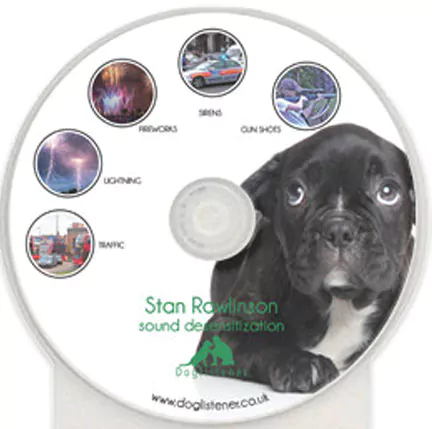
The technique involves exposing the subject to a low level of what actually causes the anxiety whilst pairing it with something positive.
Start the medication a week or so before using the disc, this allows the dog to get used to the medication and to feel more relaxed.
It is always prudent to discuss all medication with your Vet.
Take your dog into a quiet room with you try and use a room that he normally uses and feels comfortable in.
Start the CD at a very low (barely audible) volume. Reassure your dog by petting it and saying “good dog” in a regular calm voice.
But only when your dog is showing no anxiety or fear, you can also reinforce this by giving quality treats at the same time.
Start off very slowly the first few times, perhaps just a couple of minutes of the low volume noise. GRADUALLY over about a week or so, increase the volume until at the end of the exercise it is quite loud.
The goal is for the dog to associate these loud noises with calmness and treats thereby relieving the fearful behaviour. This technique works well for most dogs, but it must be done correctly or it can worsen your dog’s reaction.
If the dog shows any anxiety or fear of the sounds switch off the CD do not fuss or praise, The leave it for a couple of days and start again at a slightly reduced volume. Always couple the above with plenty of exercises and a good diet
Tips to Remember:
A suitable place to hide – When the season begins, try and ensure your dog is already in their favourite room. All you need to do is to modify this room 2 weeks before to make it more suitable as a hideout. Put down lots of blankets for them to burrow in, and include an old unwashed piece of your clothing as the dog will feel comforted by your indirect presence. If possible the room should have minimal windows and blacking out the room removes the potentially additional problems of flashing lights and flares etc. Do not close the door!
Distractions – Provide plenty of familiar toys, special long-lasting treats that will occupy your dog for long periods of time. Chewing has a calming effect on dogs, the actual act of chewing creates endorphins in the brain that soothes and relaxes anxious and fearful dogs. (4) Natural Air Dried Dog Chews also consider games that can help distract the pet.
Try to provide background sounds from the radio or television. As mentioned before classical or soothing type music is sometimes preferred, keep the volume at a loud but comfortable level.
Feeding and medication – Bowls of water are essential, and it is a good idea to make sure that your dog has emptied his bladder an hour before the display starts. Feed your dog a good meal, rich in complex carbohydrates with added vitamin B6. Remember to start the Skullcap and Valerian a few weeks prior to the start of the events if at all possible.
Your behaviour – Do not punish your dog when he is scared, he may have trashed the house or soiled himself. He has not done this deliberately. Chastising or punishing only reinforces that whatever frightened him initially, and will convince your dog it really is something to be very afraid of and will make him worse. Don’t fuss; pet or try to reassure him. This acts as a reinforcement for his fearful behaviour. Although it is hard, you must ignore any fearful behaviour that occurs.
©Stan Rawlinson 2003 updated June 2018





